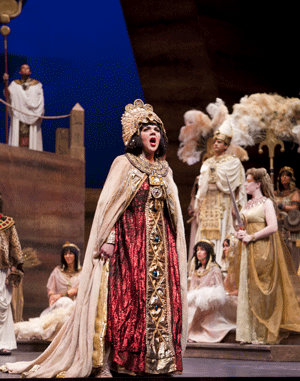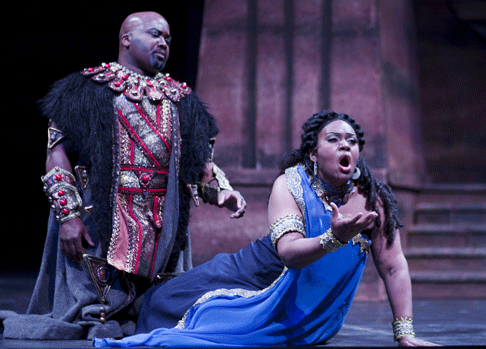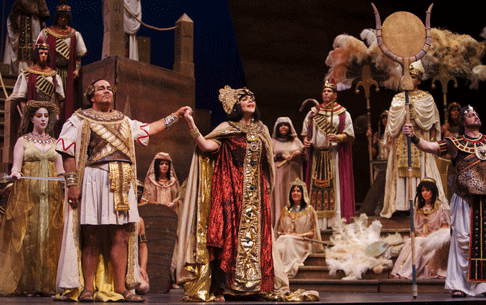![Arnold Rawls as Radames [Photo by Tim Fuller / Arizona Opera]](http://www.operatoday.com/OptGF3X9406.gif)
19 Mar 2012
Aida in Arizona
Two live camels with trainers in Egyptian garb were stationed in front of Phoenix’s Symphony Hall to publicize the opening of Arizona Opera’s new production of Aida.
English Touring Opera are delighted to announce a season of lyric monodramas to tour nationally from October to December. The season features music for solo singer and piano by Argento, Britten, Tippett and Shostakovich with a bold and inventive approach to making opera during social distancing.
This tenth of ten Live from London concerts was in fact a recorded live performance from California. It was no less enjoyable for that, and it was also uplifting to learn that this wasn’t in fact the ‘last’ LfL event that we will be able to enjoy, courtesy of VOCES8 and their fellow vocal ensembles (more below …).
Ever since Wigmore Hall announced their superb series of autumn concerts, all streamed live and available free of charge, I’d been looking forward to this song recital by Ian Bostridge and Imogen Cooper.
Although Stile Antico’s programme article for their Live from London recital introduced their selection from the many treasures of the English Renaissance in the context of the theological debates and upheavals of the Tudor and Elizabethan years, their performance was more evocative of private chamber music than of public liturgy.
Evidently, face masks don’t stifle appreciative “Bravo!”s. And, reducing audience numbers doesn’t lower the volume of such acclamations. For, the audience at Wigmore Hall gave soprano Elizabeth Llewellyn and pianist Simon Lepper a greatly deserved warm reception and hearty response following this lunchtime recital of late-Romantic song.
For this week’s Live from London vocal recital we moved from the home of VOCES8, St Anne and St Agnes in the City of London, to Kings Place, where The Sixteen - who have been associate artists at the venue for some time - presented a programme of music and words bound together by the theme of ‘reflection’.
'Such is your divine Disposation that both you excellently understand, and royally entertaine the Exercise of Musicke.’
‘And there was war in heaven: Michael and his angels fought against the dragon; and the dragon fought and his angels, And prevailed not; neither was their place found any more in heaven … that old serpent … Satan, which deceiveth the whole world: he was cast out into the earth, and his angels were cast out with him.’
There was never any doubt that the fifth of the twelve Met Stars Live in Concert broadcasts was going to be a palpably intense and vivid event, as well as a musically stunning and theatrically enervating experience.
‘Love’ was the theme for this Live from London performance by Apollo5. Given the complexity and diversity of that human emotion, and Apollo5’s reputation for versatility and diverse repertoire, ranging from Renaissance choral music to jazz, from contemporary classical works to popular song, it was no surprise that their programme spanned 500 years and several musical styles.
The Academy of St Martin in the Fields have titled their autumn series of eight concerts - which are taking place at 5pm and 7.30pm on two Saturdays each month at their home venue in Trafalgar Square, and being filmed for streaming the following Thursday - ‘re:connect’.
The London Symphony Orchestra opened their Autumn 2020 season with a homage to Oliver Knussen, who died at the age of 66 in July 2018. The programme traced a national musical lineage through the twentieth century, from Britten to Knussen, on to Mark-Anthony Turnage, and entwining the LSO and Rattle too.
With the Live from London digital vocal festival entering the second half of the series, the festival’s host, VOCES8, returned to their home at St Annes and St Agnes in the City of London to present a sequence of ‘Choral Dances’ - vocal music inspired by dance, embracing diverse genres from the Renaissance madrigal to swing jazz.
Just a few unison string wriggles from the opening of Mozart’s overture to Le nozze di Figaro are enough to make any opera-lover perch on the edge of their seat, in excited anticipation of the drama in music to come, so there could be no other curtain-raiser for this Gala Concert at the Royal Opera House, the latest instalment from ‘their House’ to ‘our houses’.
"Before the ending of the day, creator of all things, we pray that, with your accustomed mercy, you may watch over us."
The doors at The Metropolitan Opera will not open to live audiences until 2021 at the earliest, and the likelihood of normal operatic life resuming in cities around the world looks but a distant dream at present. But, while we may not be invited from our homes into the opera house for some time yet, with its free daily screenings of past productions and its pay-per-view Met Stars Live in Concert series, the Met continues to bring opera into our homes.
Music-making at this year’s Grange Festival Opera may have fallen silent in June and July, but the country house and extensive grounds of The Grange provided an ideal setting for a weekend of twelve specially conceived ‘promenade’ performances encompassing music and dance.
There’s a “slide of harmony” and “all the bones leave your body at that moment and you collapse to the floor, it’s so extraordinary.”
“Music for a while, shall all your cares beguile.”
The hum of bees rising from myriad scented blooms; gentle strains of birdsong; the cheerful chatter of picnickers beside a still lake; decorous thwacks of leather on willow; song and music floating through the warm evening air.
![Arnold Rawls as Radames [Photo by Tim Fuller / Arizona Opera]](http://www.operatoday.com/OptGF3X9406.gif)
Two live camels with trainers in Egyptian garb were stationed in front of Phoenix’s Symphony Hall to publicize the opening of Arizona Opera’s new production of Aida.
They symbolize the buoyant optimism that surrounds this rising company after several years under General Director Scott Altman. Budgets are in the black and artistic quality is rising. Aida is an ambitious work for any company, and Arizona Opera delivered a strong performance on the first of five sold-out nights in Phoenix and Tucson.
 Daveda Karanas as Amneris
Daveda Karanas as Amneris
In an era where opera companies must watch the bottom line, conveying the grandeur of this spectacular work poses a unique challenge. Arizona borrowed a set from New Orleans Opera by Canadian designer Philip Silver, which provided two-dimensional, minimalist faux-massive painted drops, accessorized with exotic statues. The latter were sometimes in Egyptian style, with impressive results in the Nile scene, and sometimes just generically ancient. Nashville Opera Director John Hoomes directed in a traditional but effective manner. The Triumphal Scene parade inevitably seemed a bit thin, but the audience was distracted by live animals—two dogs and the return of one of the camels. To its credit, the set design pushed the action to the front of the stage, boosting the vocal acoustics in Phoenix’s large multi-purpose hall.
 Kevin Short as Amonasro and Lisa Daltirus as Aida
Kevin Short as Amonasro and Lisa Daltirus as Aida
Aida was cast with a strong and well-matched set of regional-level American singers. To the title role soprano Lisa Daltirus brings a silvery tone, gossamer high notes, and intelligent phrasing. She used these qualities to make a memorable success of moments many sopranos fear, such as the infamous dolce high C in “O patria mia.” Yet the role of Aida demands not only this, but powerful low notes and passionate utterances that cut through heavy orchestration, which Datirus rarely delivers. While her characterization had integrity and pathos, at times she seemed to be tip-toeing through it.
Chicago-based Tenor Arnold Rawls is similarly more comfortable at the top than the bottom of the range required for Radamès. His lack of a fine-spun piano and unvarying color undermined quietly transcendent moments, as in most of the final scene; but elsewhere Rawls made satisfying use of vocal warmth, stentorian high notes, and fine phrasing. “Celeste Aida,” for example, was phrased impressively on one breath into the second verse, and—after some savvy preparation—ended on an impressively long and ringing b-flat.
 Rebecca Sjowall as High Priestess, Arnold Rawls as Radames, Daveda Karanas as Amneris and Peter Volpe as Ramphis
Rebecca Sjowall as High Priestess, Arnold Rawls as Radames, Daveda Karanas as Amneris and Peter Volpe as Ramphis
As Amneris, Greek-American mezzo Daveda Karanas, a graduate of cross-town Arizona State University, possesses a tightly focused, slightly steely voice that easily penetrated the orchestra—rather in the mold of Fiorenza Cossotto. Her interpretation is that of a mature artist, and she is a compelling actress. The voice lacks—perhaps as of yet—quite all the warmth, color and amplitude that the greatest exponents of this role possess, but her traversal of this role in a smaller theater—she is slated to sing the role at Glimmerglass Opera this summer—would be worth traveling to hear.
Altman favors even casts with strong voices in smaller roles, particularly lower male parts. Amonasro does not require great subtlety, and Kevin Short, an American baritone based in Europe, did not provide it—but he was commanding when it mattered. The veteran Ramfis, Peter Volpe, displayed a voice of impressive weight and color. In an era of soggy Verdi conducting, Steven White proved refreshingly willing to push the tempo along, achieved some lovely transitions and orchestral balances, and kept the forces together in the face of a few opening night mishaps.
Andrew Moravcsik